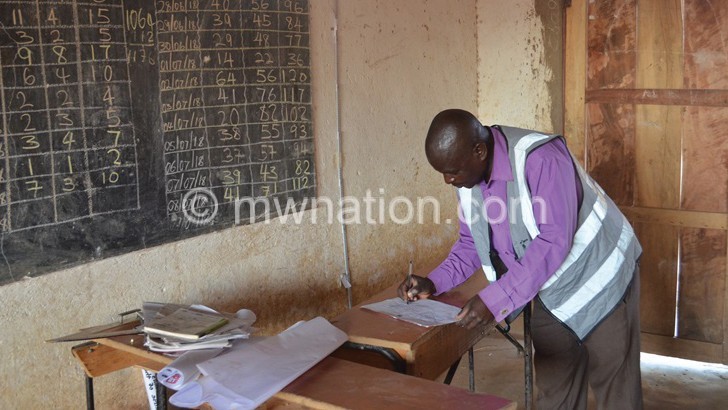Phase one voter registration ends amid concerns
Phase one of the voter registration exercise closed on Monday in Kasungu, Dedza and Salima districts amid fears that thousands could be disenfranchised in the May 21 2019 Tripartite Elections after failing to register due to logistical hitches.
The first phase of voter registration in the three Central Region districts was characterised by low turnout, largely attributed to poor voter and civic education as well as technical glitches that reportedly frustrated would-be voters.

Malawi Electoral Commission (MEC) and National Registration Bureau (NRB) conducted dual registration at the centres where people without national identity cards (IDs) were registering first before their details were entered into the voters’ roll.
While the cumulative figures for registered voters in the three districts were yet to be compiled, a MEC official in Kasungu confirmed figures were lower than projected.
A sample which the Catholic Commission for Justice and Peace (CCJP) collected from some centres in Kasungu also shows that only 436 against the projected figure of 2 000 were cumulatively registered at Thimbi Primary School while Kawata Centre registered 811 people against a projected figure of 2 500 as of Monday, the last day of registration.
Mkomachilolo and Kavunguti had 360 and 230 people registered against the projected figures of 1 300 and 1 000, respectively, according to CCJP.
When The Nation visited Chankhanga, Kasungu RDP and Kadoweke centres on Monday afternoon, the registered number had doubled from the day before.
For example, about 225 people registered at Chankhanga Centre on Sunday, but the figure rose to over 450 by 2pm while many people were seen flocking to the centre when others were still on the queue waiting to be registered.
A number of people The Nation interviewed said they did not turn up for registration in good time because they planned to register later, thinking that there was still time for them.
In Dedza, it is feared that close to 200 000 eligible voters have not registered after phase one closed on Monday.
Dedza district commissioner Elsie Tembo said the district expected to register an estimated 400 000 voters, but about 160 000 had registered as of the weekend.
Random visits by The Nation to some voter registration centres in the district on Monday revealed increased turn up as communities scrambled to get registered before the exercise wound up.
Meanwhile, political parties have since called on MEC to carry out an analysis of the first phase and engage stakeholders on the way forward.
Last week, People’s Party spokesperson Noah Chimpeni asked MEC to extend the registration period in the first phase to cover up for lost time when equipment broke while MCP called upon MEC to suspend the whole process until all the problems were rectified.
MCP secretary general Eisenhower Mkaka blamed MEC for the inadequate sensitisation to support what political parties like theirs were doing on the ground.
National Initiative for Civic Education (Nice) Trust executive director Ollen Mwalubunju yesterday said in an interview that there is need for MEC to conduct an analysis on how the first phase went so that electoral stakeholders should have evidence based solutions over the matter.
Chancellor College-based political analyst Ernest Thindwa has warned that the 2019 Tripartite Elections will be characterised with violence if the voter registration period cannot be extended to allow more people to register.
He said: “MEC is being careless with the response. They need to understand what others are saying considering that there are a number of issues that led to the low turnout of people for registration.”
CCJP national coordinator Boniface Chibwana observed that many voters in the first phase would be disenfranchised because they thought the biometric national identity cards will be used for voting.
On Monday this week, MEC chairperson Jane Ansah told The Nation in a telephone interview that the commission will not extend registration period to allow people who did not register in phase one before it wound up on Monday.





